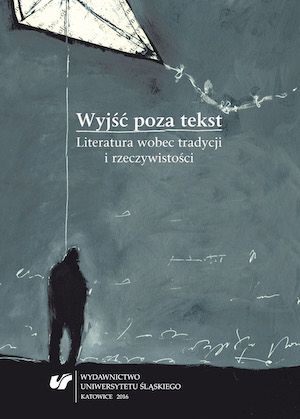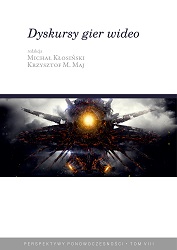

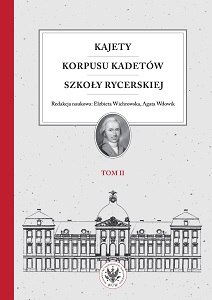
Keywords: School of Chivalry; University of Warsaw; Corps of Cadets; Stanislavian period
The publication concerns the history of the School of Chivalry (1765–1794). It discusses the issues of the everyday life of the cadets and professors of the Corps of Cadets, the topographical and architectural arrangement of the grounds of the contemporary main campus as well as models of modern education of the School of Chivalry. The authors reconstruct the ideological model proposed by the founders of the School.
More...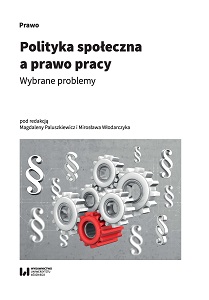
The study is concentrated on general overview and remarks related to policy on ageing, which nowadays become the policymakers’ respond on the challenges caused by changes in demographic structure. The subjective and objective scope of this policy resulted in appearance of the arguments for its’ treatment as the separate to social policy and independent domain of the public policy. Therefore the discussion was focused on main principles and aims of the policy on ageing with the pointing out the distinctive role of labour law as the leading mean in implementing of indicated principles.
More...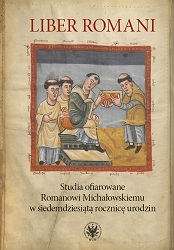
Keywords: Roman Michałowski; medieval history; Church history; Christianity in the early Middle Ages; Pope Gregory VII; Dictatus pape
An anniversary publication for the renowned medieval historian Professor Roman Michałowski. The articles collected in the volume address the widely understood issues of medieval political and religious culture as well as the history of the Church in that period. Their authors, experts on the Middle Ages, come from Poland and from abroad and are not only historians but also archaeologists.
More...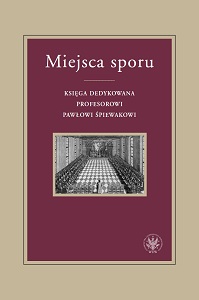
Keywords: bourgeois; money; ruins; sociability; value; life
Th e following article is devoted to the thought of the German sociologist Georg Simmel.It is an attempt at drawing conclusions on the “bourgeois” and “bourgeois sociology”,understood as a certain “culture of life”. Th e author tries to avoid interpreting Simmel’sconcepts as a “classic of late modernity” and instead considers the intellectual eff ect ofSimmel’s work, i.e. attempts to start a refl ection on the post-bourgeois world. Th e mainthemes of the analysis are: sociability, money, life, value, ruins. As a result, the authortries to see in Simmel a daring “partisan thinker”.
More...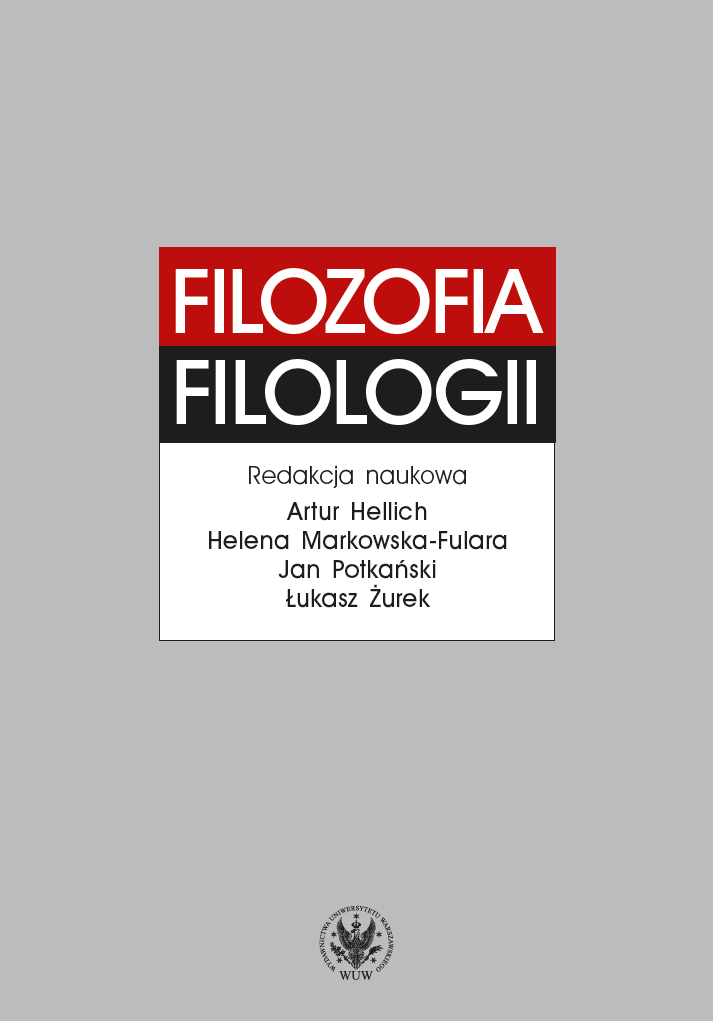
Keywords: philology; Wincenty Lutosławski; Jan Baudouin de Courtenay; Jan Bołoz Antoniewicz; history of Polish humanities
The author presents a brief history of the reception of philology in post-war Americaand describes the Anglo-Saxon trend of the “return to philology,” which began in the1990s. The author argues that modern attempts to redefine philology often copy the traditional historiographical narrative, in which material is subordinated (selected andorganized) to metaphors of “development,” “decline,” “fall” or “end.” As a result of suchan approach, scholars overlook the context of different philological traditions and heterogenous utterances concerning philology, diverging from the canonized narrative. Following these remarks, the author proposes an alternative model of writing (about) the history ofphilology, whose key aspect is placing different definitions of philology and philological practices in the precise cultural milieu of time and space.
More...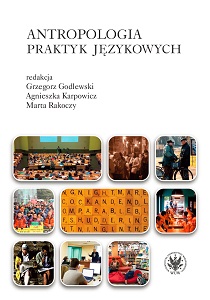
Keywords: language practice; cultural practice; word anthropology; linguistic anthropology
Development and concretisation of the original perspective concerning the word anthropology, which was formed at the Institute of Polish Culture at Warsaw University and used in language practice research. The perspective is considered the best method to perceive the language as cultural phenomenon. An extensive theoretical introduction justifies this approach and puts the undertaken research into the context of contemporary changes in cultural studies. The volume contains twelve articles which present study cases of language practice seen as cultural practice in historical context: from antiquity to modern times, from the forms of word art to swearing and searching the web.
More...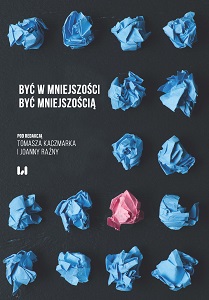
Keywords: Włodzimierz Perzyński;Spring;Paris;modernist novel;migration;city
The subject of the work are selected spatial aspects of the novel Spring (1911) by Włodzimierz Perzyński. The Paris sequence of the story of the novel, representative of the modernist period in the writer’s work, was discussed. The focus of attention was on the cultural image of Paris at the turn of the 19th and 20th centuries in the context of contemporary migration processes and poetics of space, examined by the tools of contemporary reflection on the role of space.
More...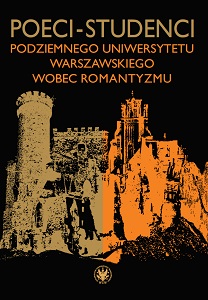
Keywords: underground University of Warsaw; poetry; students; occupation literature; Warsaw Uprising; World War II
The book is a successful attempt to renew research on the literature of war and occupation conducted so far, and at the same time to present the phenomenon of the underground University of Warsaw and its educational, academic, and cultural activity in particular with regard to literary studies. The authors describe the profiles of young artists for whom the ideas of Romanticism were a constant point of reference in their writing and in the armed combat against the occupier.
More...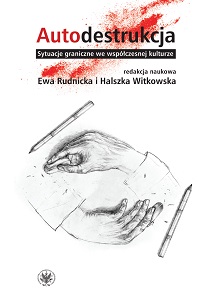
Keywords: suicide; suicide out of love; William Shakespeare; Romeo and Juliet; presuicidal syndrome; stereotype
The article is devoted to the analysis of William Shakespeare’s Romeo and Juliet, paying special attention to the suicidal motivations of the protagonists. The starting point for the deliberations is the stereotype of suicide out of love, rooted deep in the social reception of this play. However, the author proves that interpreting Romeo’s and Juliet’s reasons to commit suicide only as an expression of romantic attachment to their lover prevents us from noticing other factors that influenced the protagonists’ decision to end their lives.
More...
Keywords: disability; narrative ethics; John Maxwell Coetzee; culture of speed; dismodernism; normativism; handicapism; narrative prosthesis; aesthetic neurosis
The article attempts to present the works of John Maxwell Coetzee from the perspective of disability studies. By conducting a cross-sectional analysis of selected novels from the early and late period of the Nobel Prize laureate’s works, the author tries to show how the ethical and narrative aspects of Coetzee’s novels contribute to challenging the normative models of portraying disability, consistently reproduced in traditional literary works and cultural discourses.
More...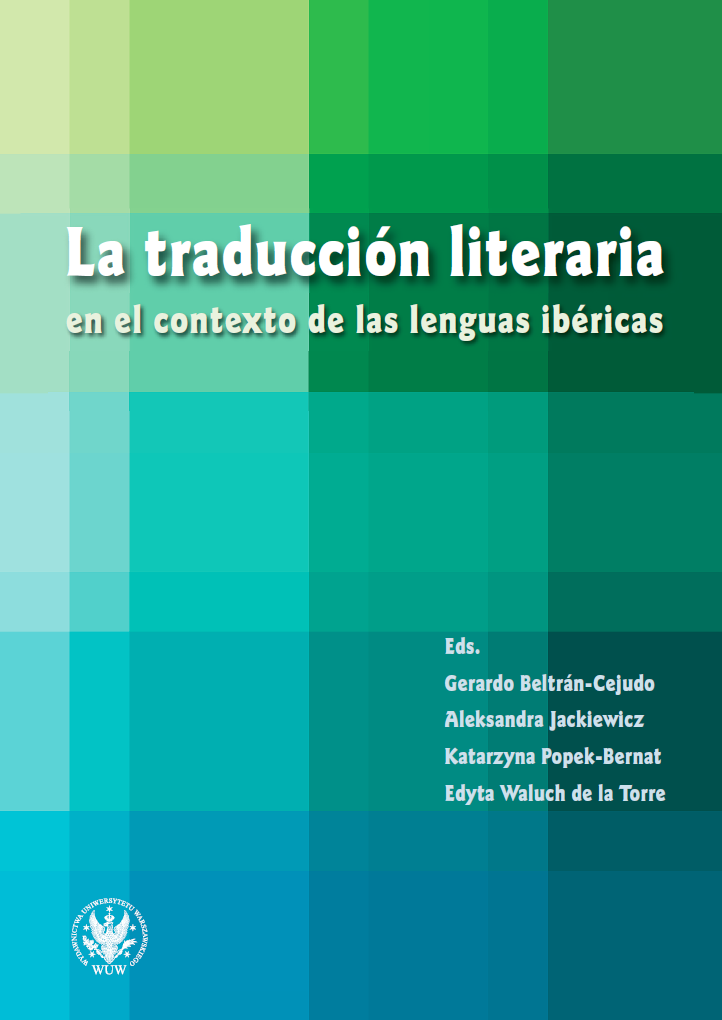
Keywords: literary translation; marginal cultures; intercultural dialogue; Polish literature; Argentinian literature
In this paper we discuss the paradoxical nature of the literary translation seen as one of the tools for international dialogue. Every literary translation depends on a variety of factors, starting with the interests and capacities of the translator and ending with the conditions of the editorial market and with the local and international political situation. Also, in view of the increasing consciousness of the intrinsic untranslatability of every text, resulting from the very essence of language, we can observe a strong tendency to perceive the translation more as an original creation than an effort to transfer meanings. This constellation of factors, which seem to function chaotically and arbitrarily, is, however, one of the most important foundations of every international dialogue. Concentrating on the cultural dialogue between Poland and Argentina and taking in consideration the marginality of these two cultures, we will demonstrate the consequences of the factors above for the cultural relations between the two countries and we will try to imagine how to improve the effectiveness of the cultural transfers between them.
More...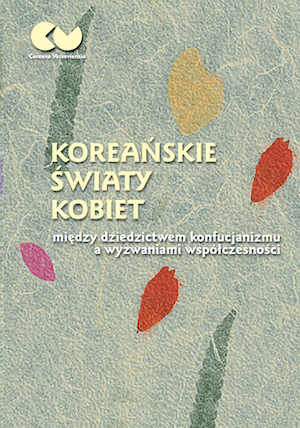
Keywords: patriarchy; First-wave Feminism; Korea under Japanese rule; new woman; gender
Throughout traditional Korean literature that developed over centuries, feminine motifs were manifested, and female authors created various poetical and prose works, but it was only in the twentieth century that women’s fiction could take the form of an ideological and artistic feminist trend. The feminine voice in Korean literature was influenced by Western ideas, and the young writer Kim Myŏng-sun, who published her works from the 1920s marked by the temperament of a moral and emotional emancipationist, became a forerunner of Korean feminism. The article explores her pioneering attempts to speak about the conditions, social barriers and perspectives of women’s liberation in the dramatic reality of the conquered country. Her works often become an artistic confrontation of her own biography filled with difficult experiences on the path of gaining personal freedom, education and the unhampered shaping of emotional relationships, which, with all the artistic constraints of the pioneer, strengthens the honesty and authenticity of her own vision of the fate of women. A special theme in her works has become the ideal of the “new woman” introduced by the literature and the women’s press published in Japan under the influence of Western culture. Kim Myŏng-sun appeared in the Japanese academic and literary environment, where she gained education and watched a society on the path of a more advanced industrial modernization. Regardless of the fact that the works of Kim Myŏng-sun gradually fell into oblivion after her death, her literary output and her role as the first feminist writer in modern Korean literature deserve to be better known.
More...
Keywords: Pak Wan-sŏ; Korean literature; Contemporary Korean prose; Feminism; Image of woman; Confucianism; Patriarchy
Pak Wan-sŏ’s work constitutes a certain phenomenon in modern Korean literature. Her abundant and very original literary output, which is mostly dedicated to the experiences of Korean women, became an inspiration for female writers of younger generations and started a new and unusual approach to shaping the image of women. Literary portraits made by Pak Wan-sŏ were enriched with an incredible acuteness of observation and deep understanding, empathy and even contained some humorous elements. Pak Wan-sŏ did not shy away from presenting the drastic, both ethically and morally, entanglements of female characters, which in a postwar Korea, was controversial and ordered not to be mentioned. Presenting these entanglements exposed Pak Wan-sŏ to ostracism from the critics and aversion by the readers. Earlier than any other writer, she noticed and understood that the literary portraits of women, which were copied on the pages of many classical and modern works, were nothing more than a cultural product – a fictional image, which only partially presented the real image of Korean women. In her work Pak Wan-sŏ pursued to smash this artificial, in her opinion, cultural construct and create a female character that could encompass the complexity of the female psyche. At the same time, she presented an antithesis of Confucian stereotypes. Moreover, in her literary output Pak Wan-sŏ traced and revealed some of the negative aspects of patriarchal culture and the ways of discriminating women. The main objective of this article is to present Pak Wan-sŏ’s prose from the standpoint of revisionism that defi ned her identity and made her an icon of feminism in Korean modern literature.
More...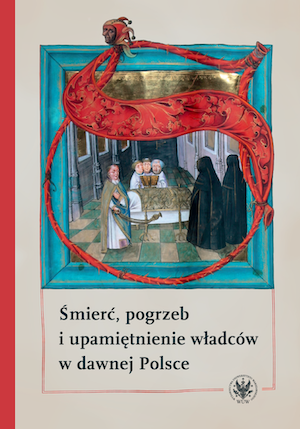
Keywords: post-mortem examination; body; corpse embalming; poison; monarch
The article focuses on post-mortem examinations of Polish kings and queens between 16th and 18th centuries. The attitude of Roman Catholic Church and university circles towards autopsy is discussed. The definition and terminology of the post-mortem examination is provided, different for the past and modern times. The subsequent part of the article addresses the objections the rulers had concerning their autopsies and expressed in their wills, the time, place and the people conducting the post-mortem examinations and the exceptions to the usual conduct. The reasons for autopsies are analysed: the need to learn the cause of death and the verification of the hypothesis about poisoning, the necessity to protect the corpse against decaying until the funeral and a very popular practice of burying different parts of the body, such as heart, liver, tongue and eyes, which started at the end of the 17th century. Finally, corpse embalming and the substances used in the process are described. In conclusion the ceremonious meaning of conducting autopsy and paying respect to the royal majesty are indicated, as well as the phenomenon of transferring the post-mortem examinations from the royal circles to aristocracy and nobility in the course of the 17th and 18th centuries.
More...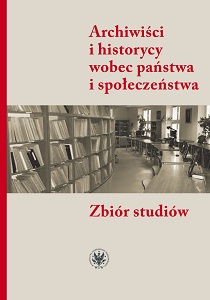
Keywords: Kazimierz Konarski; war; archives; history; happiness; state; society
The article aims to present K. Konarski’s views on history, state and society. It is also an attempt to broaden studies on archivists’ biographies through showing their social views and relationships with their environment. It corresponds with the thesis expressed by the author of the article. There are many factors crucial for the publication of Konarski’s memoirs: one of them was his intention to recount his own experiences during the Second World War and preserve the memory of the deeds performed by his family, the archivist community, the people of Warsaw and the conspiracy organisations operating in the city. As Konarski’s memoirs have many threads, it is extremely difficult to put them in the hierarchical order. Konarski used many forms when talking about the past. He appreciated literary narrative in history, which enabled him to access many more readers, especially children and the youth. These two groups are important addressees of his works: he considered communicating with them a key element of historian and archivist’s activity. A literary narrative was a valuable form of promoting knowledge of the archives’ resources. Konarski’s memoirs are a major source of understanding his personality and values: he appreciated work and tried to be optimistic in life. His war experiences enabled him to show any war as a factor destroying people, social relationships, belief in what is right and trust in other people. In his memoirs he treated all social groups, not only the elite of the society, with respect. His ethical and academic decisions relied on the values grounded on the reflections about the past and the reverence for Polish cultural heritage.
More...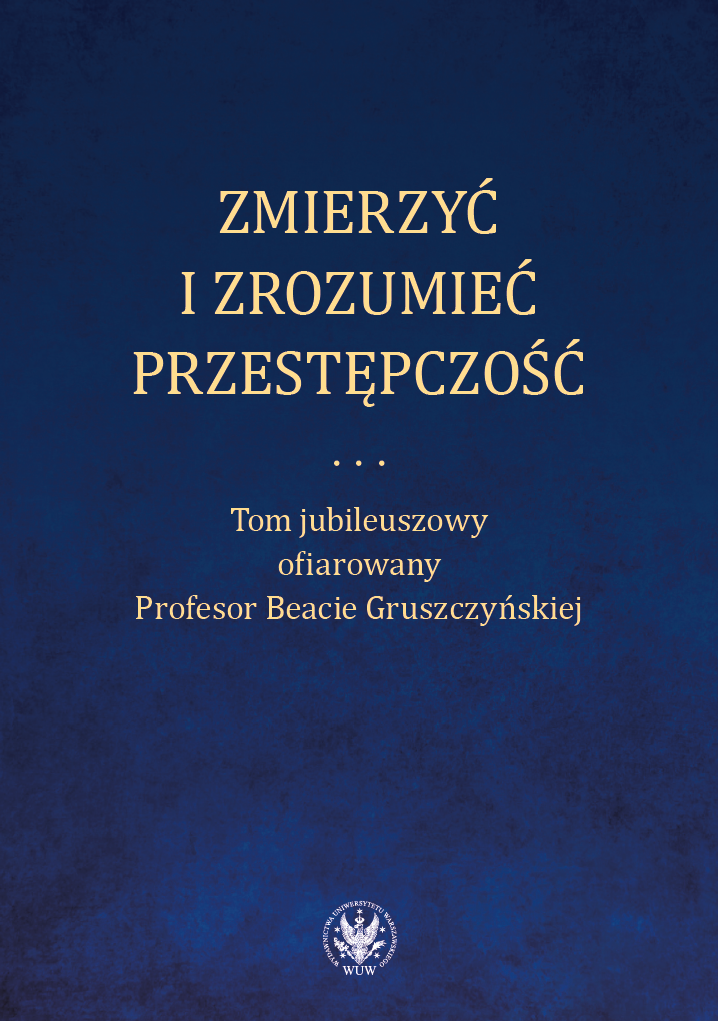
Keywords: criminology; crime statistics; crime; woman abuse; prison sentence; victim
A study on criminology prepared to celebrate the jubilee of Professor Beata Gruszczyńska. The authors perform a criminological analysis of crime statistics, explore crime against women and cybercrime, describe crime in contemporary Ukraine and Russia and reflect on prison sentences and capital punishment.
More...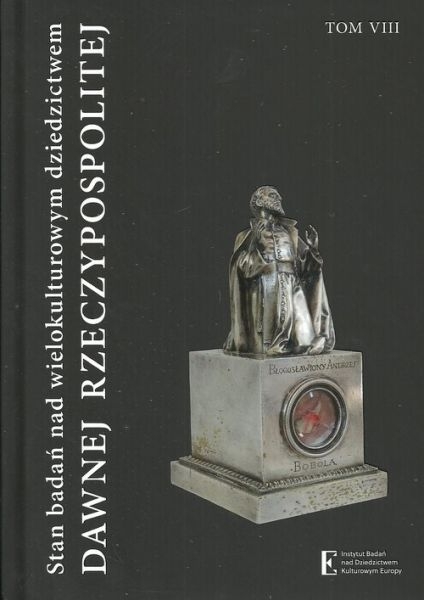
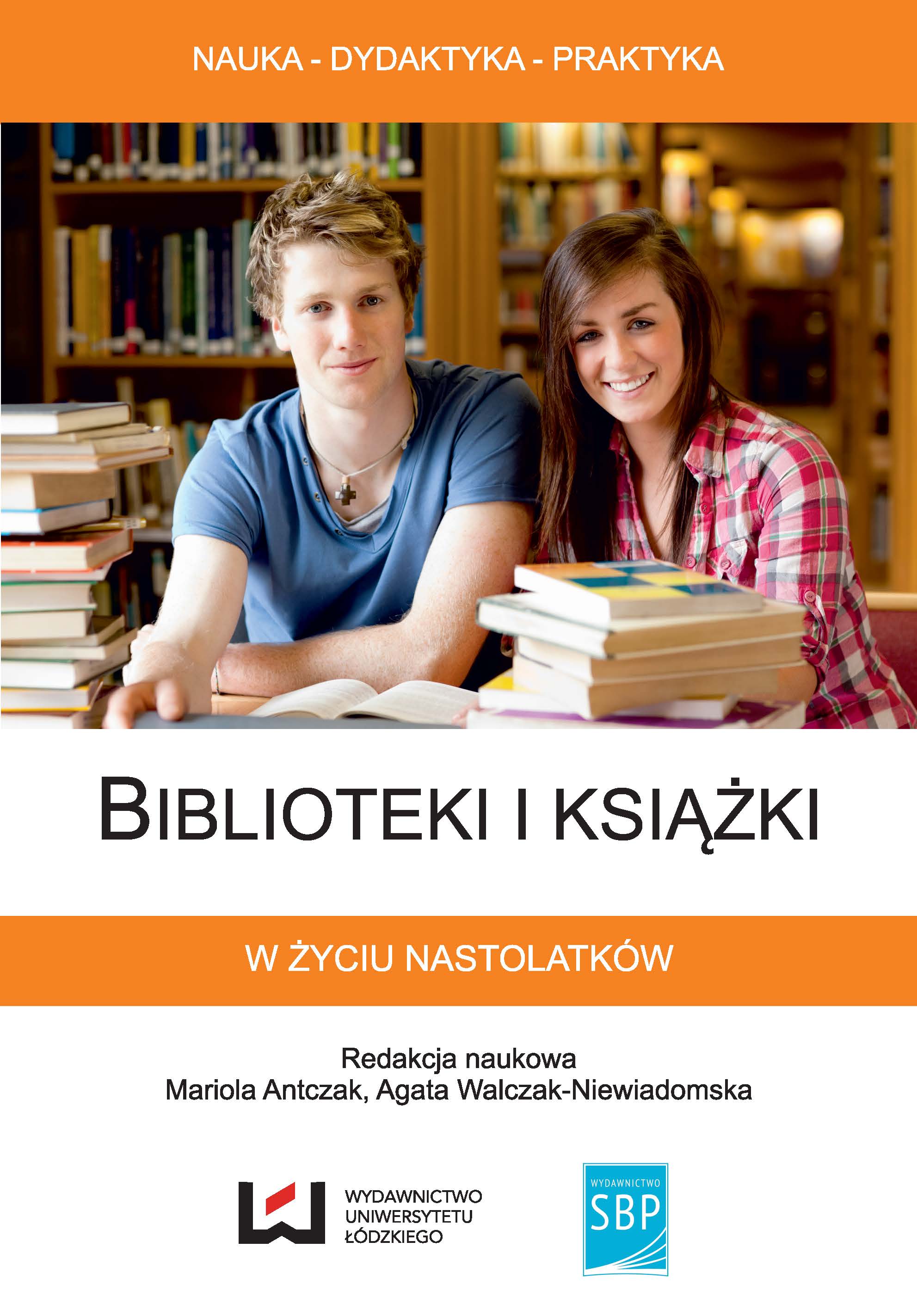
Keywords: reading culture;Łódź;primary school
The survey aimed at description and verification of the reading culture of the group of teenagers (11 and 12 years old Łódź inhabitants), including evaluation of its scale, and comparison of opinions expressed by the youth and their parents. Both the students and their parents (although in slightly different form) were asked to present their opinions about: attitudes towards reading, reading preferences, their private book collections, as well as the role of parents and other people in shaping their reading habits.
More...